I’ve had the bulk of this newsletter in my drafts folder for months. I haven’t written much this year, as evidenced by my Substack archive and my empty Google Drive drafts folder. Life since the start of school has felt a bit relentless. Parenting a high schooler has not been a walk in the park, my anxiety about the election and disbelief at how it is even close has pretty much been at a steady increase since the DNC, our home is enveloped by construction noise and dust most days of the week, and then Hurricane Helene ravaged the other place we think of as home, Black Mountain, North Carolina.
The scale of the destruction in the southeast is impossible to imagine. I’ve heard some criticize people in western North Carolina for not evacuating, but even the loudest weather forecasters couldn’t have imagined what Hurricane Helene unleashed last week on the Blue Ridge Mountains of western North Carolina and eastern Tennessee.
The climate emergency is here, and what happened in the aftermath of Hurricane Helene to places hundreds of miles from a coast should be a fair warning to all of us that the climate crisis is coming for our places too.

Over the past several months, as I’ve tried to process the fight for the habitat around our place and the destruction all around, I’ve come to consider if our place could become an analogy for what is coming and already here (obviously). We are up against the desecration at best and destruction at most likely of many of our most beloved places. And I’m not really talking here about the natural wonders of the world, although those are of course in danger and important. I’m talking here of places like our corner, or the old grove of trees across the street that probably only my kids ever played in in the last twenty years but generations of creatures played and lived and died there. When I was a kid, there was this ravine that us kids would meet at after long days of bike tag. There were giant vines that we would swing from, daring each other to take ever bigger jumps, until eventually, the vines broke - usually in the process of one of us joyfully and terrifyingly flying across - enough that we could no longer reach them. I haven’t been back to that ravine in decades, and I don’t want to try to find it because I’m sure it’s been destroyed or built over, which are often the same things if you ask me. We moved away from the house by the ravine, but I found new sacred places in our new home - the huge trees around the old Friends cemetery that I would run to in high school, this one property with rolling hills (an anomaly in central Indiana) that I daydreamed about buying somehow as a teenager.
What place(s) comes to mind for you when I describe these seemingly smaller places?
I love the places that we all (most of us) treasure - the grand places like Yellowstone and Yosemite, the national forests, and the state parks. Those places are in danger too, but maybe because I’ve always had a heart for the underdog, I’m more concerned for the places that are beloved by a handful of people instead of thousands or millions.
I wrote in this newsletter that we can do our best to subvert the system in our little place, and I love that plan. I’m a contrarian at heart, so give me bucking the system every day of the week. But too, we could love our place not despite of the destruction all around, but somehow as a way of learning (or reminding ourselves) that loving anything involves loving all of it, supposed flaws and all. What I mean is that so many of our sacred spaces are either already desecrated or will be in the coming decades. If you haven’t deeply grieved the destruction we’re wreaking as a species, you are being invited to do that work now. Come to our place. Look at the destruction of what used to be compared to what is now. Ask the people of Swannanoa, Black Mountain, Chimney Rock, Old Fort, Montreat, and Lake Lure. Those people are on my mind because I know and love those places, but there are disasters in nearly every corner of the globe these days.
In light of Hurricane Helene, the destruction at our place is miniscule, but perhaps what we do here to continue to foster life could be a sanctuary not only for the all of the life that has been displaced around us, but also an invitation for those us grieving what we’re losing. We have to do the hard work of grief, as I’ve written many times before, in order to compost it into something new and life-giving. If we refuse to grieve, if we numb it, or if we just tamp it down, it comes out sideways in increasingly destructive ways.
Last year, when the developer razed the old growth forest closest to our property, Grant and I went out and tried to rescue what we could. We dug up some black raspberry patches, some tiny red cedars that hadn’t yet been mowed down, hefted a few rocks into the Gator to do something to honor the lost forest, and we dug up part of the patch of native mayapples that I had always loved. We planted them in a shady spot close to our barn. I tried to remember to water them, but I wasn’t the best because nothing else needed watered over there. Last fall, I figured they were lost too.
But then, this April, they popped up, looking lively and happy to be there. It wasn’t the same as what had been lost, but it was there - a reminder of how we can work together to preserve and protect what we can, grieve and honor what we’ve lost, and rebuild new ways forward.
The communities of western North Carolina are showing us what will be necessary for so many of us in the coming years - interdependence, resilience, and a fierce cultivation of hope.
Let us learn from them who, like the mayapples, will come back - different, yes, but stronger and with lessons for all of us.
We are going to Black Mountain to help as soon as we won’t be putting more stress on the community there. In the meantime, we’re giving to Black Mountain Presbyterian because they are running one of the two main relief centers in Black Mountain and to BeLoved Asheville. Send me your donation receipt (sara@sarabytheseason.com), and I’ll match it up to $500.

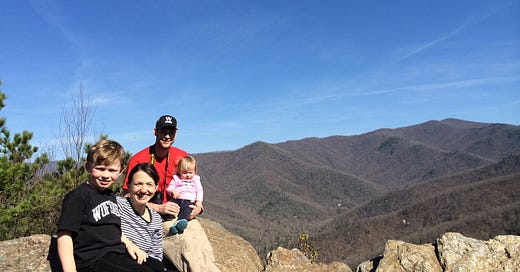



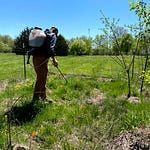
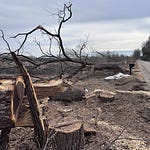
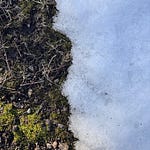
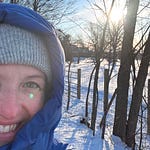

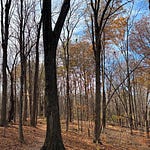
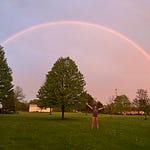
Share this post